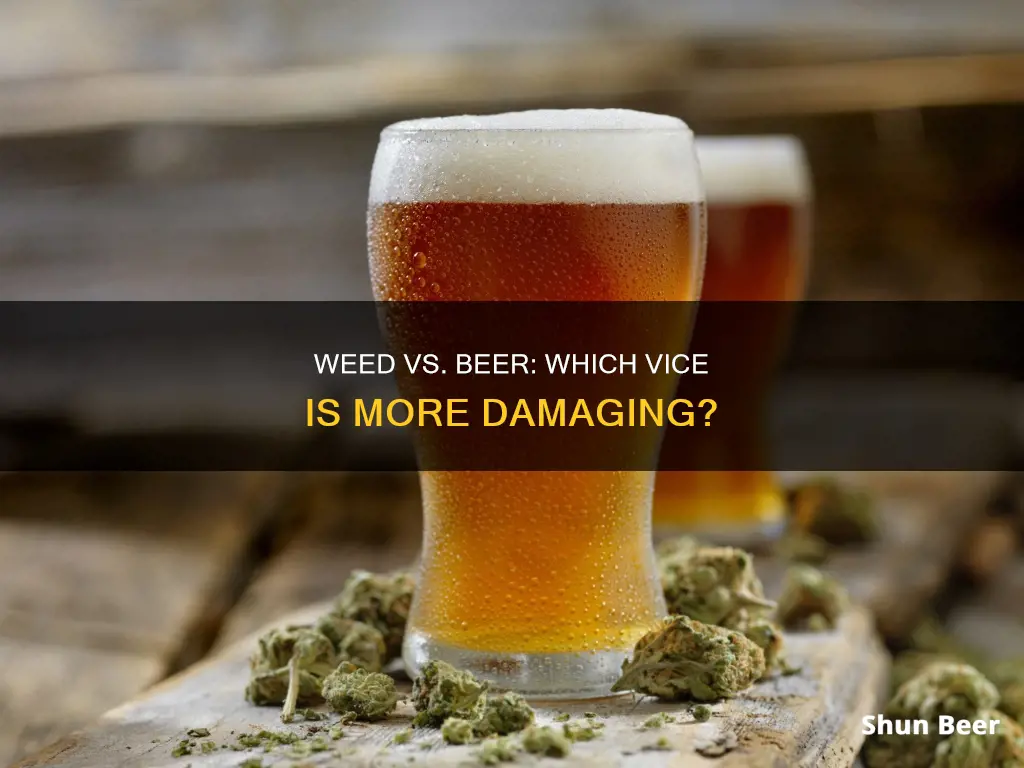
Alcohol and weed are both intoxicating substances that can alter your thinking and coordination, but they have very different health effects. While alcohol is a well-known depressant that impairs thinking and coordination, weed also has depressant effects and can impact your brain chemistry. Both substances carry risks and can be addictive, but is one worse than the other?
When it comes to the potential for harm, alcohol appears to pose more health risks overall. Alcohol is linked to chronic diseases, accidental injuries, violence, and memory and learning problems. It is also a known human carcinogen, increasing the risk of developing cancer. In contrast, weed has important medical benefits and appears to have fewer long-term risks, although more research is needed to fully understand its effects.
However, it's important to note that the comparison between the two substances is not straightforward. The effects of alcohol are better understood due to more extensive research, while the science of cannabis is murkier due to its mostly illegal status. Additionally, individual factors, such as family medical history and method of consumption, can also influence the impact of these substances.
While alcohol may pose more risks overall, both substances can have detrimental effects on health, memory, and behaviour, and it is not safe to drive or engage in risky activities under their influence.
| Characteristics | Values |
|---|---|
| Addictiveness | Alcohol is more addictive than weed. 15% of people who have tried alcohol will become addicted, compared to 9% for weed. |
| Health Risks | Alcohol has more clear health risks than weed, including liver disease, pancreatitis, heart damage, stomach and digestive issues, and central nervous system damage. |
| Long-term Effects | The long-term effects of weed are less clear than those of alcohol due to a lack of research. However, both substances can have negative long-term effects on the brain, memory, and mental health. |
| Driving | Both alcohol and weed can impair driving ability, but alcohol has a much more significant impact. Combining the two is especially dangerous. |
| Violence | Alcohol is linked to violent behaviour and interpersonal or domestic violence, while weed is not. |
| Weight Gain | Alcohol is linked to weight gain, while weed is not, despite increasing appetite. |
| Overdose | It is extremely difficult for weed to cause an overdose, while alcohol overdoses are common and can be fatal. |
| Cancer | Alcohol is a known carcinogen and is linked to an increased risk of several types of cancer. There is no clear link between weed and cancer. |
| Death | Alcohol is a leading risk factor for death, with thousands of people dying from alcohol-induced causes each year. There have been no reported deaths from weed alone. |
What You'll Learn

Alcohol is linked to violent crime, whereas cannabis is not
Alcohol and cannabis are unique substances that produce different effects, making a side-by-side comparison difficult. However, it is clear that alcohol is linked to violent crime, whereas the same cannot be said for cannabis.
Alcohol plays a significant role in criminal activities and violence. Excessive drinking impairs judgement and increases the risk of aggressive behaviour. Research has shown that engaging in prolonged drinking or binge drinking significantly increases the risk of committing violent offences. Alcohol-related violence and crime rates are on the rise, and the monetary cost of alcohol-related crime in the United States alone has been estimated at over $205 billion, more than twice the economic cost of all other drug-related crimes combined.
Alcohol is a well-known risk factor for domestic abuse, assault, and even murder. It is often involved in intimate partner violence, leading to aggression, intimidation, forced sexual activity, and other forms of controlling behaviour. Alcohol is also a factor in child abuse, with roughly four in ten child abusers admitting to being under the influence of alcohol during the offence.
In addition, alcohol is frequently linked to driving under the influence (DUI) or driving while intoxicated (DWI), which is the crime of operating a motor vehicle while impaired by alcohol or other drugs. This can lead to accidents, injuries, and even fatalities.
On the other hand, cannabis has a more complex relationship with violence. While it has been linked to psychosis and mental illness, the extent of its direct connection to violent crime is less clear. Some studies suggest that cannabis use is a significant risk factor for violence, particularly in individuals with pre-existing psychotic disorders. However, the stigma associated with cannabis has made it difficult to conduct extensive research in this area.
While heavy marijuana use among youths can lead to increased addiction and antisocial behaviour, the overall link between cannabis and violent crime is not as strong or direct as it is with alcohol.
RV Beer Drinking: What You Need to Know
You may want to see also

Alcohol is a known carcinogen, unlike cannabis
On the other hand, while cannabis smoke has been implicated in respiratory dysfunction and there are concerns about its effects on lung health, it has not been causally linked with tobacco-related cancers such as lung, colon, or rectal cancers. Some studies have even shown that compounds found in cannabis have been shown to kill numerous cancer types, including lung cancer, breast and prostate cancer, leukemia and lymphoma, glioma, skin cancer, and pheochromocytoma.
The differences in the carcinogenic properties of alcohol and cannabis can be attributed to their distinct pharmacological activities, which result in different biological endpoints. While both tobacco and cannabis smoke contain many of the same carcinogens and tumor promoters, the additional pharmacological activities of cannabis, including its receptor-dependent and independent activities, result in a downregulation of immunologically-generated free radical production and a protective effect against pro-carcinogens.
It is important to note that the way cannabis is consumed can impact its health effects. Smoking cannabis can damage the lungs and lead to respiratory issues, while other methods such as edibles or vaping may have different health considerations.
While alcohol is a known carcinogen, the long-term effects of cannabis are not as clear, and more research is needed to fully understand its potential risks and benefits.
Beer's Impact on Protein in Urine: A Surprising Discovery
You may want to see also

Alcohol is linked to a higher risk of obesity
Alcohol is a significant source of energy, with 7.1 kcal per gram. Moderate alcohol consumption may not lead to weight gain, but heavy drinking is more consistently associated with weight gain. Alcohol can cause weight gain in four ways: it stops your body from burning fat, it's high in kilojoules, it can make you feel hungrier, and it can lead to cravings for salty and greasy foods.
Several studies have found a positive correlation between alcohol intake and Body Mass Index (BMI) in men. However, the relationship between alcohol and BMI in women is less clear, with some studies finding a small negative association. Other studies have found that only excessive or heavy drinking is correlated with increased measures of adiposity. Binge drinking has been associated with a greater risk of obesity.
The effect of alcohol on weight gain may be influenced by various factors, including gender, type, frequency, and amount of alcohol consumed, drinking pattern, physical activity level, sleeping habits, and genetic factors. Men are more likely to drink beer, which is carbohydrate-rich and provides more energy than wine per standard drink. Beer consumption has been positively associated with abdominal adiposity ("beer belly") in men but not consistently in women.
In summary, alcohol intake may be a risk factor for obesity, especially when consumed in large quantities. The relationship between alcohol and weight gain is complex and influenced by various factors.
The Perfect Way to Drink Corona Beer
You may want to see also

Alcohol is more addictive than cannabis
While both alcohol and cannabis have addiction potential, alcohol is considered more addictive. Alcohol use disorder is a relatively common issue, with 15 million people in the United States suffering from it, according to the National Institute on Alcohol Abuse and Alcoholism (NIAAA). In contrast, the lifetime risk of dependence on cannabis is lower, with about 9% of cannabis users becoming dependent, compared to about 16% for alcohol.
Alcohol use disorder can manifest in various ways, such as being unable to cut down on alcohol consumption, experiencing strong cravings, having to change one's schedule due to drinking and hangovers, and dealing with withdrawal symptoms when not drinking. The social aspect of alcohol consumption also plays a role in its addictiveness, as it is often associated with celebrations, socializing, and making experiences more fun.
Cannabis dependence, on the other hand, is more likely to develop when individuals start using it as teenagers. The chance of becoming dependent is essentially nil if one starts using cannabis after the age of 25. Withdrawal symptoms for cannabis are also generally less intense than those associated with alcohol or other drugs. However, it is important to note that the research on cannabis addiction is limited due to its illegal status in many places, and the legalization of cannabis may lead to an increase in its addictiveness as it becomes more readily available.
The difference in addictiveness between alcohol and cannabis can be attributed to several factors. Firstly, alcohol has been legal and easily accessible for a longer period of time, making it more widely available and socially acceptable. Secondly, the immediate effects of alcohol intoxication, such as impaired cognitive skills and coordination, can lead to a higher risk of developing a dependence compared to cannabis. Additionally, the social and cultural norms surrounding alcohol consumption may contribute to its higher addictiveness, as it is often associated with celebration and relaxation.
In summary, while both alcohol and cannabis can lead to addiction, alcohol is generally considered more addictive due to its wider availability, social acceptance, and the immediate effects it has on the user. However, it is important to recognize that the addictiveness of any substance can vary from person to person, and seeking professional help is always recommended when dealing with substance misuse or addiction.
Beer and Food Pairing: A Guide to Enhancing Your Taste Buds
You may want to see also

Alcohol has more harmful effects on the brain
Alcohol impairs thinking and coordination and has a direct impact on the brain and body. Excessive drinking, even on a single occasion, can have serious health consequences. Binge drinking, heavy drinking, and alcohol use disorder are all forms of excessive drinking, and they can lead to memory and learning problems. These issues can persist even after years of abstinence, indicating long-term damage to the brain. The more alcohol is consumed, the greater the risk of cognitive impairment and the development of brain disorders.
On the other hand, the effects of weed on the brain are less severe and mostly temporary. The immediate effects of weed include impaired cognitive skills, coordination, and reflex issues, and altered perception of time. While these effects are similar to those of alcohol, they do not appear to have the same long-term consequences. However, there is some evidence that weed consumption may be linked to brain development issues, especially when consumed during the teenage years. Additionally, weed can trigger temporary feelings of paranoia and hostility, but the link between these symptoms and long-term psychosis is not yet clear.
When comparing the two substances, it is important to consider that alcohol has been studied more extensively due to its legal status, while the science of cannabis is less understood because of its illegal status in many places. Therefore, there may be unknown risks associated with weed consumption that have not yet been identified.
In summary, while both alcohol and weed can negatively impact the brain, alcohol appears to have more harmful and long-lasting effects, particularly on memory and cognitive functions.
Beer and FODMAP Diet: What You Need to Know
You may want to see also
Frequently asked questions
There are various factors to consider when comparing the health effects of drinking beer and smoking weed, and the science is still unclear on many of the long-term effects of both substances. However, based on current knowledge, it appears that drinking beer may pose more health risks than smoking weed. For example, alcohol is linked to an increased risk of several types of cancer, while weed is not. Alcohol is also a well-known cause of liver disease, while there is no evidence that weed has the same effect. In addition, alcohol is linked to violent behaviour and accidents, including car crashes, much more often than weed.
As above, it appears that drinking beer may be worse for your health than smoking weed. However, it is important to remember that both substances can have negative effects on your health and well-being. Both can impair memory and cognitive function, and heavy use of either substance is linked to greater risks, including addiction.
Alcohol slows your heart rate, while weed speeds it up. However, there is insufficient evidence to support or refute the idea that weed increases the risk of a heart attack. On the other hand, low to moderate drinking has been linked to a lower risk of heart attack and stroke.
Both weed and alcohol can impair memory and cognitive function, but in different ways. Alcohol can cause blackouts by rendering the brain incapable of forming memories, while weed does not have the same effect. However, studies have found that weed can impair memory for several weeks after use, especially in adults who started smoking at a young age. Chronic alcohol use can also lead to longer-term reductions in memory, attention, and planning abilities.







